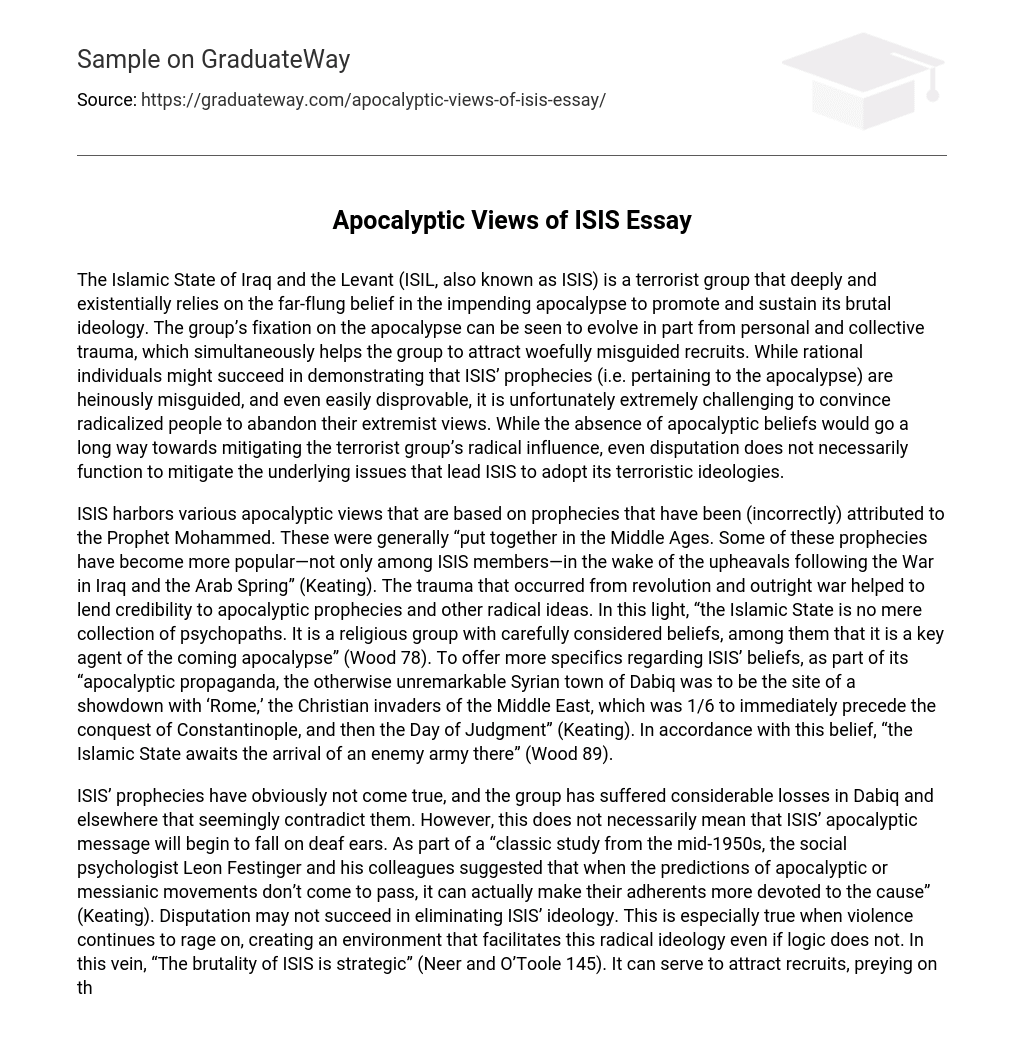The Islamic State of Iraq and the Levant (ISIL, also known as ISIS) is a terrorist group that deeply and existentially relies on the far-flung belief in the impending apocalypse to promote and sustain its brutal ideology. The group’s fixation on the apocalypse can be seen to evolve in part from personal and collective trauma, which simultaneously helps the group to attract woefully misguided recruits. While rational individuals might succeed in demonstrating that ISIS’ prophecies (i.e. pertaining to the apocalypse) are heinously misguided, and even easily disprovable, it is unfortunately extremely challenging to convince radicalized people to abandon their extremist views. While the absence of apocalyptic beliefs would go a long way towards mitigating the terrorist group’s radical influence, even disputation does not necessarily function to mitigate the underlying issues that lead ISIS to adopt its terroristic ideologies.
ISIS harbors various apocalyptic views that are based on prophecies that have been (incorrectly) attributed to the Prophet Mohammed. These were generally “put together in the Middle Ages. Some of these prophecies have become more popular—not only among ISIS members—in the wake of the upheavals following the War in Iraq and the Arab Spring” (Keating). The trauma that occurred from revolution and outright war helped to lend credibility to apocalyptic prophecies and other radical ideas. In this light, “the Islamic State is no mere collection of psychopaths. It is a religious group with carefully considered beliefs, among them that it is a key agent of the coming apocalypse” (Wood 78). To offer more specifics regarding ISIS’ beliefs, as part of its “apocalyptic propaganda, the otherwise unremarkable Syrian town of Dabiq was to be the site of a showdown with ‘Rome,’ the Christian invaders of the Middle East, which was 1/6 to immediately precede the conquest of Constantinople, and then the Day of Judgment” (Keating). In accordance with this belief, “the Islamic State awaits the arrival of an enemy army there” (Wood 89).
ISIS’ prophecies have obviously not come true, and the group has suffered considerable losses in Dabiq and elsewhere that seemingly contradict them. However, this does not necessarily mean that ISIS’ apocalyptic message will begin to fall on deaf ears. As part of a “classic study from the mid-1950s, the social psychologist Leon Festinger and his colleagues suggested that when the predictions of apocalyptic or messianic movements don’t come to pass, it can actually make their adherents more devoted to the cause” (Keating). Disputation may not succeed in eliminating ISIS’ ideology. This is especially true when violence continues to rage on, creating an environment that facilitates this radical ideology even if logic does not. In this vein, “The brutality of ISIS is strategic” (Neer and O’Toole 145). It can serve to attract recruits, preying on their trauma.
In the end, ISIS’ focus on the purportedly impending apocalypse provides the terrorist group its raison d’etre. The absence of its apocalyptic messaging existentially threatens the group. This is why brutality and violence are so necessary to ISIS, as these factors further apocalyptic messaging and views, providing urgency and persistence to the group’s terroristic mission. In order to effectively eliminate ISIS, it would be necessary to greatly undermine the group’s ability to promote notions of the apocalypse, an especially daunting task given the commitment that ISIS has shown to engaging in actions that are seemingly apocalyptic.





